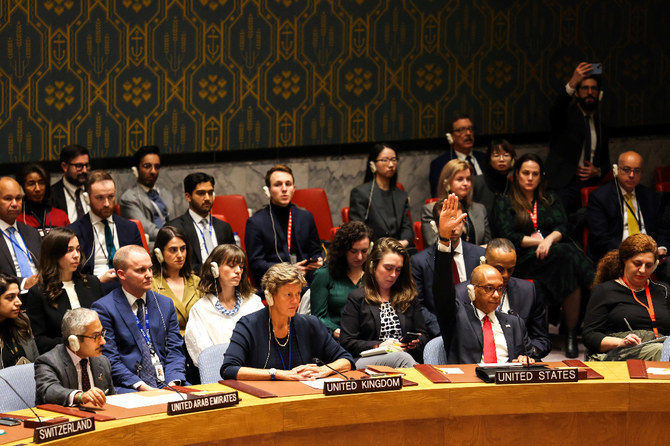
Only days after the decision by Karim Khan, the International Criminal Court’s chief prosecutor, to seek arrest warrants for leaders of Israel and Hamas, and after the International Court of Justice ruled that Israel must halt any military offensive in the southern Gazan city of Rafah that risks harming civilians, Israeli forces last Sunday killed at least 45 people in a tent camp in the city when an airstrike ignited a massive blaze.
It was almost as if Israel was doing the job for the court by demonstrating the urgent need for an intervention to end this war.
The latest deadly assault was further tragic evidence that what Israel describes as its “limited operation” in Rafah is extremely deadly for the people who remain there, civilians in particular, and it was similar to the attacks already inflicted by the Israeli military on other parts of the Gaza Strip.
For a change, Israeli Prime Minister Benjamin Netanyahu took responsibility for the incident but refused to apologize for it. Instead he described a strike that killed dozens of displaced Palestinians as a “tragic mishap.”
But by this stage of the war the international community has run out of patience with such excuses, as the evidence continues to mount against Israeli authorities for their neglect in the failure to protect the lives of many thousands of civilians.
The situation was not improved by an Israeli army spokesperson who said the deadly attack had been carried out “according to international law.”
And so innocent people continue to be killed, with no end in sight to the war. On Wednesday, Israel’s national security adviser, Tzachi Hanegbi, said: “We expect another seven months of fighting in order to deepen the accomplishments and achieve what we have defined as the destruction of the governmental and military capabilities of Hamas.”
In other words, Israel is set on prolonging this hell on Earth for the people of Gaza for many more months.
The reaction to the killings in Rafah might have been more muted had this been an isolated incident but that is not the case. Hence the ICJ, in response to South Africa’s request to the court for an interim order compelling Israel to put hostilities in Gaza on hold, ruled: “Israel must immediately halt its military offensive, and any other action in the Rafah Governorate, which may inflict on the Palestinian group in Gaza conditions of life that could bring about its physical destruction in whole or in part.”
Admittedly, the court did not go so far as to call on Israel to cease its military operations throughout the territory, or even just in Rafah, instead ordering it to take all possible steps to avoid actions that constitute genocide.
Regardless of the ICJ ruling — or the arrest warrants, still pending approval by ICC judges, requested by Khan for Netanyahu and Israel’s Defense Minister Yoav Gallant, as well as the leader of Hamas in Gaza, Yahya Sinwar, the commander of its Qassam Brigades, Mohammed Deif, and the head of its political bureau, Ismail Haniyeh, all on charges of crimes against humanity — the horrendous reality for the 2.3 million people in Gaza remains unchanged and is not going to improve any time soon.
Innocent people continue to be killed, with no end to war in sight.
Yossi Mekelberg
So many of them have lost loved ones, been injured, maimed for life, lost everything they owned and been displaced several times. Yet it is not outside the realm of possibility that none of those for whom warrants are requested or issued will ever be arrested, as long as they do not travel to countries that are signatories to the ICC’s Rome Statute, which covers genocide, crimes against humanity, war crimes, and the crime of aggression.
The cries of outrage from Israeli authorities about the court decisions is the result of their inherent siege mentality, which was exacerbated by the attack by Hamas on Oct. 7. This causes them to interpret any criticism of their operations in Gaza as antisemitic, and reinforces their deep-seated belief that the entire world is against Israel. This view is cynically exploited by Netanyahu and others in his government to fend off all criticism, be it constructive and legitimate or otherwise.
But realistically, as long as Israel can rely on the full backing of Washington, including the latter’s calls to sanction the ICC, cut the funding that supports the court’s programs or, as was suggested by US Secretary of State Antony Blinken, to work with Congress on legislation that would penalize the court for its the decision of its chief prosecutor, Israeli leaders will remain defiant as far as calls for a ceasefire are concerned.
Tactically, and perhaps naively, Khan made a mistake by in a single stroke requesting warrants for the arrest of leaders of both Hamas and Israel, on charges of crimes against humanity, thereby equating an organization that is proscribed as a terrorist organization by many countries with a state that has an independent judiciary albeit that Israel’s judiciary is under immense pressure from a mindless Netanyahu government that seeks to undermine it.
It is that very independence of Israel’s judiciary that has saved the nation from such investigations in the past. However, its present passivity — especially among senior law-enforcement officials, who have failed to exercise the complementarity principle of international law, which states that “the ICC has secondary jurisdiction after national courts, and can only act in a given situation if the relevant states are unwilling or unable to prosecute the crimes within their jurisdiction” — has forced the international legal system to conclude that allegations of war crimes are not going to be investigated by Israel’s own legal system, and certainly not while the war is ongoing.
The moves by the ICC and the ICJ might turn out not to be deciding factors in halting the war. But, as much as protests within Israel itself, they certainly contribute to the erosion of the legitimacy of authorities in the country as a result of their war in Gaza and their relations with Palestinians more generally.
Israel might have a point when it argues that international law and its related institutions are not treating every country equally. However, it was one of the beneficiaries of that system for many years. One can but hope that all investigations of war crimes brought against leaders and countries believed to merit such action will be carried out in the same, unbiased manner.
For Israel, this is also a time to put its own house in order and ask how it reached this point of international isolation, when even its closest friends are finding it difficult to defend the actions of the nation.
It is for the courts to decide the legality of Israel’s behavior during this war, but the immorality and self-defeating nature of its actions are clear for all to see.
Yossi Mekelberg is a professor of international relations and an associate fellow of the Middle East and North Africa Program at international affairs think tank Chatham House. X: @YMekelberg












